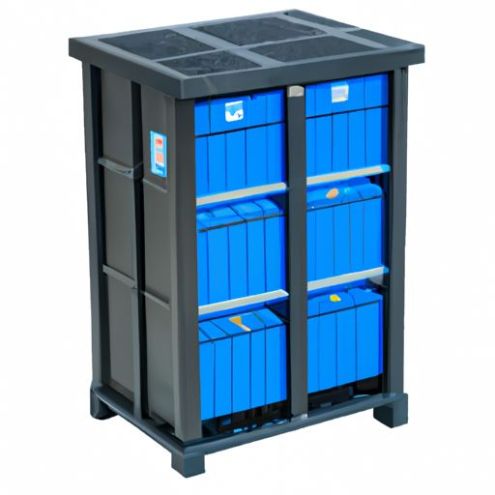Table of Contents
Benefits of Using a Wall-Mounted 48V Lithium Battery Box for Solar Energy Storage
As the demand for Renewable Energy sources continues to grow, many homeowners and businesses are turning to solar power as a clean and sustainable option. One of the key components of a Solar Energy System is the battery storage solution, which allows for the storage of excess energy generated by Solar Panels for use during times when the sun is not shining. One popular option for solar energy storage is a wall-mounted 48V lithium battery box, which offers a range of benefits for users looking to maximize the efficiency and performance of their solar energy system.
One of the primary benefits of using a wall-mounted 48V lithium battery box for solar energy storage is its high energy density. Lithium Batteries are known for their high energy density, which means they can store a large amount of energy in a relatively small and lightweight package. This is especially important for solar energy systems, where space may be limited and users want to maximize the amount of energy they can store for use during periods of low sunlight.
In addition to their high energy density, lithium batteries also offer excellent performance and efficiency. Lithium batteries have a high charge/discharge efficiency, which means they can store and release energy with minimal loss. This is important for solar energy systems, where users want to maximize the amount of energy they can store and use. Additionally, lithium batteries have a long cycle life, meaning they can be charged and discharged thousands of times without losing their capacity. This makes them a reliable and cost-effective option for solar energy storage.
Another benefit of using a wall-mounted 48V lithium battery box for solar energy storage is its modular design. Many lithium battery boxes are designed to be easily expandable, allowing users to add additional battery modules as needed to increase their storage capacity. This modular design makes it easy for users to customize their solar energy system to meet their specific energy storage needs, whether they are looking to power a small residential home or a large commercial building.
Furthermore, wall-mounted 48V lithium battery boxes are often equipped with advanced battery management systems that help to optimize the performance and longevity of the batteries. These systems monitor the state of charge, temperature, and voltage of the batteries, and can automatically adjust the charging and discharging parameters to ensure the batteries are operating at their peak efficiency. This helps to extend the life of the batteries and maximize their performance over time.
Overall, using a wall-mounted 48V lithium battery box for solar energy storage offers a range of benefits for users looking to maximize the efficiency and performance of their solar energy system. From high energy density and excellent performance to modular design and advanced battery management systems, lithium battery boxes are a reliable and cost-effective option for storing solar energy. Whether you are looking to power a small residential home or a large commercial building, a wall-mounted 48V lithium battery box can help you make the most of your solar energy system.
Comparison of 200Ah, 230Ah, 280Ah, and 300Ah Battery Packs for Solar Panel Systems
When it comes to choosing a battery pack for your solar panel system, there are several factors to consider. One of the most important considerations is the capacity of the battery, which is typically measured in ampere-hours (Ah). In this article, we will compare four different battery packs with capacities of 200Ah, 230Ah, 280Ah, and 300Ah to help you determine which one is best suited for your energy needs.
First, let’s take a look at the 200Ah battery pack. This battery pack is a popular choice for smaller solar panel systems or for those who have limited space for battery storage. With a capacity of 200Ah, this battery pack can store a decent amount of energy and is suitable for powering basic appliances and electronics. However, if you have a larger solar panel system or plan to expand your system in the future, you may want to consider a battery pack with a higher capacity.
Next, we have the 230Ah battery pack. This battery pack offers a slightly higher capacity than the 200Ah pack, making it a good choice for medium-sized solar panel systems. With a capacity of 230Ah, this battery pack can store more energy and can power a wider range of appliances and electronics. If you have a moderate energy consumption and want a battery pack that can handle your needs without being too large or expensive, the 230Ah pack may be the right choice for you.
Moving on to the 280Ah battery pack, this option is ideal for those with larger solar panel systems or higher energy consumption. With a capacity of 280Ah, this battery pack can store a significant amount of energy and can power multiple appliances and electronics simultaneously. If you have a large household or plan to use a lot of energy throughout the day, the 280Ah pack may be the best choice for you.
Finally, we have the 300Ah battery pack. This battery pack offers the highest capacity of the four options and is suitable for those with very high energy consumption or large solar panel systems. With a capacity of 300Ah, this battery pack can store a substantial amount of energy and can power multiple appliances, electronics, and even larger devices such as Air Conditioners or refrigerators. If you have a high energy demand and want a battery pack that can handle all of your needs without running out of power, the 300Ah pack may be the best option for you.

In conclusion, when choosing a battery pack for your solar panel system, it is important to consider the capacity of the battery and how it aligns with your energy needs. The 200Ah, 230Ah, 280Ah, and 300Ah battery packs each offer different Levels of capacity and are suitable for different types of solar panel systems. By carefully evaluating your energy consumption and requirements, you can select the battery pack that best meets your needs and ensures that your solar panel system operates efficiently and effectively.

